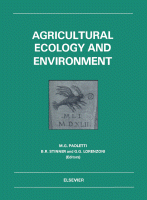Browse content
Table of contents
Actions for selected chapters
- Full text access
- Book chapterNo access
Introduction
M.G. PAOLETTI, B.R. STINNER and G.G. LORENZONI
Pages 1-2 - Book chapterNo access
AUTHOR INDEX
Pages 621-625 - Book chapterNo access
SUBJECT INDEX
Pages 627-636
About the book
Description
The increased use of chemical fertilizers and pesticides in crop production has adversely affected both the environment and the agricultural economy. Not only has it led to environmental pollution, but also the increasing costs of chemical inputs and the low prices received for agricultural products have contributed to economic unprofitability and instability.
The International Symposium on Agricultural Ecology and Environment was organised in order to discuss ways of achieving the goals of economically and environmentally sustainable agriculture. It is apparent that a truly multidisciplinary effort is required and for this reason the meeting was attended by authors from many different disciplines and geographical locations. Although their papers reflect a wide diversity of agroecosystem types and examples, several common themes emerge: the increased importance of biotic control of ecosystem processes in lower input systems; the key role of soil organic matter in stabilizing nutrient cycling; the importance of agricultural landscape diversity and complexity; the importance of studying ecological processes in natural and agricultural ecosystems; the critical need to integrate socio-economic and ecological approaches.
The increased use of chemical fertilizers and pesticides in crop production has adversely affected both the environment and the agricultural economy. Not only has it led to environmental pollution, but also the increasing costs of chemical inputs and the low prices received for agricultural products have contributed to economic unprofitability and instability.
The International Symposium on Agricultural Ecology and Environment was organised in order to discuss ways of achieving the goals of economically and environmentally sustainable agriculture. It is apparent that a truly multidisciplinary effort is required and for this reason the meeting was attended by authors from many different disciplines and geographical locations. Although their papers reflect a wide diversity of agroecosystem types and examples, several common themes emerge: the increased importance of biotic control of ecosystem processes in lower input systems; the key role of soil organic matter in stabilizing nutrient cycling; the importance of agricultural landscape diversity and complexity; the importance of studying ecological processes in natural and agricultural ecosystems; the critical need to integrate socio-economic and ecological approaches.
Details
ISBN
978-0-444-88610-1
Language
English
Published
1989
Copyright
Copyright © 1989 Elsevier B.V. All rights reserved.
Imprint
Elsevier Science
